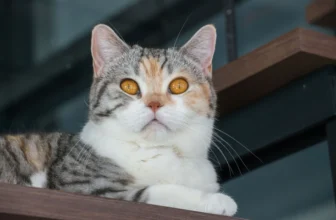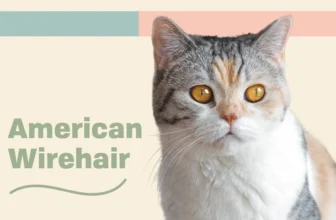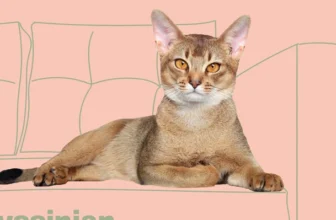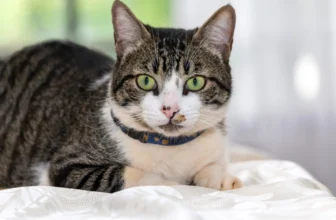It’s no secret that cats are complex creatures with unique personalities, and just like humans, they too can experience mental health issues. One such issue is feline depression, which can have a significant impact on a cat’s overall health and well-being. This condition is not always easy to detect, and even more difficult to treat, particularly in American Wirehair cats who are prone to depression. Understanding the underlying causes, symptoms, and effects of feline depression on American Wirehairs is crucial in helping pet owners care for their furry friends. In this article, we will delve deeper into this subject, providing insights and practical advice on how to detect, manage, and even prevent feline depression in American Wirehairs.
What is Feline Depression?
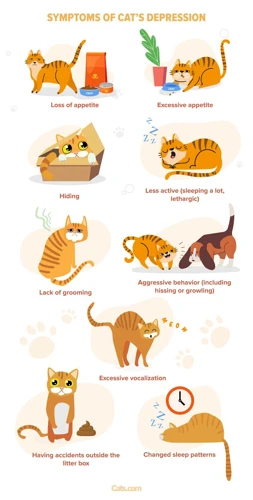
Have you noticed your American Wirehair behaving differently lately? Are they more lethargic than usual, not interested in playing, or eating less? These may be signs that your cat is experiencing feline depression, a condition that can affect any cat, including American Wirehairs.
Feline depression is a complex condition that can be difficult to identify and understand. While it is not as well-known as depression in humans, it can have serious consequences on a cat’s physical and emotional health. Understanding the causes, symptoms, and effects of feline depression is the first step in helping your American Wirehair feel better and lead a happier, healthier life.
Read on to learn more about what feline depression is and how it can affect your cat.
If you’re interested in preventing feline depression or providing mental stimulation for your American Wirehair, check out our tips for providing mental stimulation for your cat or reducing stress for your American Wirehair. You can also try incorporating interactive play into your cat’s routine or even yoga to promote their happiness and wellbeing.
Causes of Feline Depression
Feline depression can be caused by a variety of factors, both physical and emotional. The following are some of the most common causes of feline depression:
- Stressful or traumatic events: Just like people, cats can become depressed after experiencing a traumatic event, such as the loss of a companion, a move to a new home, or a major change in routine.
- Chronic illness or pain: Cats with chronic pain or illness may become depressed due to ongoing discomfort or stress.
- Lack of socialization: Cats that are not exposed to enough human or animal interaction during their early development may become socially isolated and depressed later in life.
- Boredom or lack of stimulation: If a cat is not given enough mental or physical stimulation, they may become bored and lethargic, which can lead to depression.
- Separation anxiety: Some cats may become depressed or anxious when separated from their owners for prolonged periods of time.
It is important to note that not all cats will become depressed for the same reason. In fact, some cats may become depressed for no apparent reason at all. If you suspect that your American Wirehair may be suffering from depression, it is important to consult with a veterinarian in order to rule out any underlying medical issues that may be contributing to their symptoms.
Reducing stress can be a key factor in preventing feline depression, and can also be a helpful treatment for cats that are already experiencing symptoms. You can learn more about how to reduce stress in American Wirehairs in our article Reducing Stress in American Wirehairs.
Symptoms of Feline Depression
Depression in cats can be difficult to diagnose as cats are skilled at hiding their emotions. However, there are some symptoms that may indicate your American Wirehair is experiencing depression.
1. Changes in Appetite: Depressed cats may experience a loss of appetite or, conversely, an increase in appetite.
2. Lethargy: A depressed American Wirehair may become less active and seem to lack energy or enthusiasm for play and interaction.
3. Withdrawal: Cats experiencing depression may become more withdrawn and less interested in social interaction with their owners or other pets.
4. Changes in Sleep Patterns: Depressed cats may sleep more than usual or, alternatively, experience insomnia and have difficulty sleeping.
5. Behavioral Changes: Cats may start exhibiting behaviors that are out of character, such as hiding more frequently, vocalizing excessively, or becoming destructive.
6. Changes in Grooming Habits: A depressed cat may groom less frequently, leading to a matted or scruffy coat.
7. Avoidance: Depressed cats may actively avoid things they used to enjoy, such as their favorite toys or lounging areas.
These symptoms may indicate your American Wirehair is suffering from depression, but it is important to rule out any underlying medical conditions. If your cat is displaying any of these symptoms, it is recommended to take them to a veterinarian for a physical examination and potential diagnostic tests.
Feline Depression in American Wirehairs
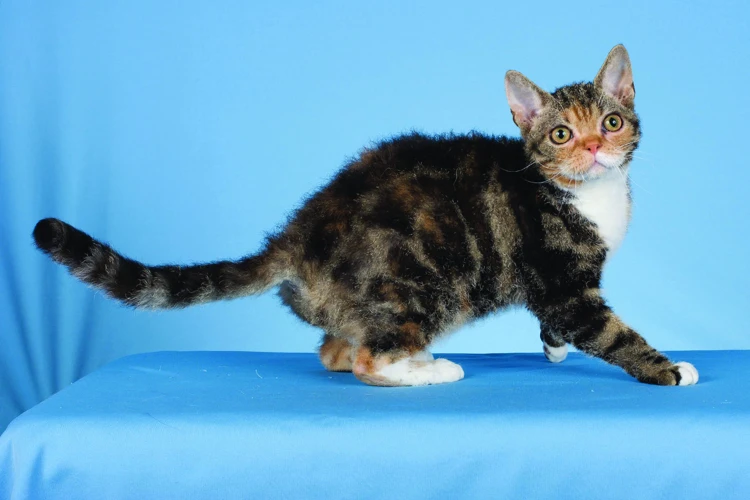
As beloved pets, our cats are members of our families, and their wellbeing is a top priority. However, feline depression is a condition that often goes unnoticed, especially when it comes to specific breeds such as the American Wirehair. While all cats can experience depression, American Wirehairs are particularly prone to this condition. In this section, we will explore the unique challenges that American Wirehairs face when dealing with depression, as well as the signs to look for and the effects that depression can have on these furry friends.
Why American Wirehairs are Prone to Depression
American Wirehairs are a unique breed of cat that possess a distinctive appearance and personality. While they are often described as active and playful, they are also known to be sensitive and emotionally complex creatures. This complex nature has been linked to their propensity for depression. Here are some of the reasons why American Wirehairs may be prone to depression:
- Intense Bonding with Owners: American Wirehairs are known to form strong bonds with their owners and become emotionally attached. When their owners are absent or unable to provide attention and affection, they can experience feelings of loneliness and separation anxiety. This emotional dependency can lead to depression when they are not able to receive the desired attention.
- Sensitivity to Change: American Wirehairs are creatures of habit and routine, and they can become upset by changes in their environment or daily routine. For example, moving to a new home or having a new pet in the household can trigger feelings of stress and anxiety. This sensitivity to change can contribute to depression in American Wirehairs.
- Health Issues: Like all animals, American Wirehairs can suffer from various health issues that can affect their emotional well-being. Chronic pain, illness, and aging can lead to a decrease in mental and physical abilities, leading to depression.
- Lack of Stimulation: American Wirehairs are active and intelligent creatures that require mental and physical stimulation to keep them healthy and happy. Without proper stimulation, they can become bored and lethargic, leading to feelings of depression and disinterest.
- Genetics: While the exact genetic components that contribute to depression in American Wirehairs are not known, there is a possibility that some cats may be predisposed to the condition due to genetic factors.
It is important to remember that while American Wirehairs may be prone to depression, this does not mean that all cats of this breed will experience depression. Every cat is an individual with unique needs and personalities, and it is up to their owners to provide them with the care and attention they need to maintain good emotional health.
Signs of Depression in American Wirehairs
As with humans, recognizing signs of depression in American Wirehairs is crucial to getting them the help they need. Some common signs of depression in cats are shown in the table below. Keep in mind that not all cats will show the same signs, and some may show no signs at all.
| Signs of Depression in American Wirehairs | Description |
|---|---|
| Changes in appetite | A depressed cat may have a decreased appetite or overeat. |
| Withdrawal or hiding | A cat may hide or avoid interaction with people or other pets. |
| Excessive sleeping or lethargy | A depressed cat may sleep more than usual or lose interest in activities they once enjoyed. |
| Aggression or irritability | Cats in pain or discomfort may become irritable or aggressive. |
| Excessive grooming | Cats may over-groom or even cause bald spots due to anxiety or stress. |
| Urinating or defecating outside the litterbox | Changes in litterbox habits can indicate depression, anxiety, or a medical issue. |
If your American Wirehair is displaying any of these symptoms or if you suspect they may be depressed, it is important to seek veterinary care. Your vet can rule out any underlying medical issues and help determine the best course of treatment.
How Depression Affects American Wirehairs
Depression can have both physical and emotional effects on American Wirehairs. The following list outlines some of the most common effects:
- Change in Appetite: A depressed American Wirehair may lose interest in food or may begin to overeat. This can lead to weight gain or weight loss, both of which can affect their overall health.
- Sleep Disturbances: Depression can cause American Wirehairs to have trouble sleeping. They may sleep more than usual or have difficulty falling asleep or staying asleep.
- Lack of Grooming: American Wirehairs are known for their meticulous grooming habits, but a depressed cat may neglect their grooming routine. This can lead to matted fur, skin infections, and other health problems.
- Reduced Physical Activity: Depressed American Wirehairs may be less active than usual. They may spend more time sleeping or hiding and less time playing or exploring.
- Behavioral Changes: American Wirehairs may exhibit new or unusual behaviors when they are depressed. This can include aggression, avoidance, or attention-seeking behaviors.
- Increased Vocalization: Cats may meow more frequently when they are depressed. This could be a sign that they are trying to communicate their distress to their owner.
- Compromised Immune System: Depression can weaken a cat’s immune system and make them more susceptible to illness and infection.
- Inability to Cope: American Wirehairs who are depressed may have difficulty coping with stress or changes in their environment. They may become more anxious or fearful than usual and may be less adaptable to new situations.
It’s important to note that all American Wirehairs may not exhibit the same symptoms of depression, and some may be more affected than others. If you suspect that your cat is depressed, it’s important to seek help from your veterinarian to determine the best course of action.
How to Help Your Depressed American Wirehair
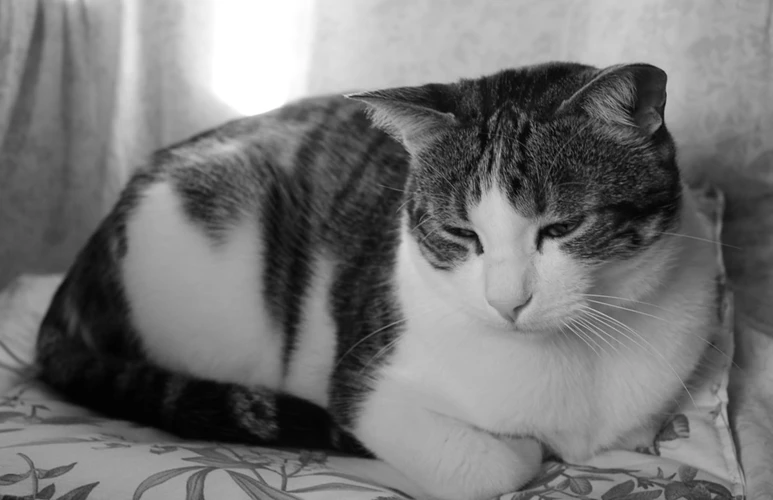
If you’ve noticed your American Wirehair displaying signs of depression, it’s understandable to feel concerned and even perplexed about what to do next. Fortunately, there are several ways to help your furry friend cope with their depression. From medical treatment to lifestyle changes and behavioral therapy, there are steps you can take to improve your cat’s emotional well-being. In this section, we’ll explore several strategies for helping your depressed American Wirehair feel better.
Medical Treatment for Feline Depression
When it comes to treating feline depression, medical intervention may be necessary in severe cases. Your veterinarian may recommend medication to help your cat feel better. Below are some commonly prescribed medications for feline depression:
| Medication | Description |
|---|---|
| Fluoxetine (Prozac) | One of the most commonly prescribed antidepressants for cats. It works by increasing serotonin levels in the brain, which can elevate mood and decrease anxiety. |
| Clomipramine (Anafranil) | Another antidepressant medication that is sometimes used to treat feline depression. It works by increasing the levels of serotonin and norepinephrine, which can improve mood and reduce feelings of sadness or hopelessness. |
| Diazepam (Valium) | A type of medication known as a benzodiazepine, which can help relax and calm your cat. It may be prescribed in addition to an antidepressant medication to help manage anxiety and stress. |
It’s important to note that medication should never be the only form of treatment for feline depression. It should always be used in conjunction with other therapies, such as behavioral modification and lifestyle changes. Additionally, medication should always be prescribed and closely monitored by a veterinarian to ensure its effectiveness and safety for your cat.
Behavioral Therapy for Feline Depression
Behavioral therapy is an effective way to manage feline depression, especially for cats who prefer not to take medication. Here are some behavioral therapy techniques you can try to alleviate your American Wirehair’s depressive symptoms:
- Play therapy: Playing with your cat is a great way to boost their mood and keep them physically active. Try using interactive toys such as feather wands or laser pointers to encourage your cat to play and exercise.
- Positive reinforcement: Reward your cat’s good behavior with treats, praise, and affection. By reinforcing positive behavior, you can help your cat associate good behavior with positive outcomes.
- Environmental enrichment: Providing your cat with a stimulating and comfortable environment can significantly improve their mood. Consider adding cat trees, scratching posts, hiding spots and other enriching items to your home to create a safe and comfortable environment for your feline friend.
- Regular routine: Cats thrive on routine, so try to establish a consistent daily routine for your furry friend. This includes regular feeding times, play sessions, and sleep schedules. A consistent routine can help reduce your cat’s stress levels and improve their overall mood.
- Massage therapy: Massaging your cat’s muscles can help relax them and reduce tension. Gently stroking and rubbing their head, back, and paws can also help stimulate blood flow and release endorphins- the feel-good hormones which can help improve their mood.
- Music therapy: Playing calming music can help reduce your cat’s stress and anxiety levels. Consider playing classical or calming music, which can help your cat feel more relaxed and at ease.
Remember, every cat is unique and may respond differently to various forms of behavioral therapy. It’s important to observe your cat’s reactions and adjust your approach accordingly. With time, patience, and consistent effort, you can help your American Wirehair overcome their depression and enjoy a happy and healthy life.
Making Lifestyle Changes to Help Your Cat
When it comes to helping your cat overcome depression, making lifestyle changes can play a significant role in their recovery. Here are some changes you can make to help your American Wirehair:
| Change | Description |
|---|---|
| Provide a Better Diet | A healthy and balanced diet is essential in improving your cat’s overall well-being. You can try switching to high-quality cat food that includes essential nutrients and avoid processed or grain-based cat food. |
| Encourage Exercise | Regular exercise can help your cat release endorphins, which can elevate their mood. You can provide interactive toys, play with them, and encourage them to run around and play. |
| Creating a Safe Haven | You can provide a safe and comfortable space in your home where your cat can retreat whenever they feel overwhelmed or anxious. This can be a cozy bed, a quiet room, or a cat tree that allows them to climb and observe their surroundings. |
| Provide Social Interaction | As social creatures, cats require interaction and attention from their owners. You can try spending more playtime with your cat, cuddling, or grooming them regularly. |
| Reduce Stressors | If there are any stressors present in your cat’s environment, try minimizing them. This can be done by placing their litter box, food, and water bowl in a quiet and separate area of your home, away from noisy appliances or other pets. |
By implementing these lifestyle changes, you may be able to help your cat overcome depression and improve their quality of life. However, it’s important to consult with a veterinarian to ensure that no underlying health conditions are causing or contributing to your cat’s depression.
Preventing Feline Depression in American Wirehairs
As a cat owner, you want to provide the best care possible for your furry friend. One way to do this is by taking steps to prevent feline depression in American Wirehairs. By providing a comfortable home environment, caring for their emotional health, and offering mental stimulation, you can help keep your cat happy and healthy. In this section, we’ll take a closer look at these preventative measures and how they can benefit your American Wirehair. So, let’s dive in and explore some ways to prevent feline depression in your cat.
Caring for Your Cat’s Emotional Health
Ensuring that your American Wirehair’s emotional health is taken care of is important to prevent the development of depression. Here are some ways to care for your cat’s emotional needs:
- Regular playtime: Playing with your cat using interactive toys such as a laser pointer or fishing pole toy can help stimulate their mind and keep them happy. Spending time with your furry friend can also strengthen the bond between the two of you.
- Set a routine: Cats like predictability, so it’s important to set a routine for feeding and playtime. This will help your cat feel secure and reduce stress levels.
- Positive reinforcement: Positive reinforcement can help boost your cat’s mood. Whenever they exhibit positive behavior, reward them with treats or praise. This can help create a positive association with the behavior and encourage them to repeat it.
- Be attentive: Pay attention to your cat’s body language and vocalization. If you notice any changes in their behavior, take note of it and investigate. It could be an indication of stress or anxiety that needs to be addressed.
- Give them space: Cats are independent creatures and require alone time. Make sure your American Wirehair has a space they can retreat to when they need to be alone.
- Provide companionship: Cats are social creatures and enjoy being around their owners. Consider adopting another cat so your American Wirehair has a companion to play with and interact with when you’re not around.
- Regular vet check-ups: It’s important to take your cat for regular check-ups to detect any underlying health issues that could affect their emotional well-being. Your vet can also recommend behavioral modification techniques if necessary.
By caring for your American Wirehair’s emotional health, you can prevent the development of depression and ensure that they lead a happy and healthy life.
Creating a Comfortable Home Environment
Cats are extremely sensitive animals and their surroundings play a significant role in their emotional well-being. Creating a comfortable home environment for your American Wirehair can go a long way in preventing feline depression.
One way to create a comfortable home environment for your cat is to provide them with a cozy and comfortable sleeping space. Cats need a warm, quiet, and comfortable spot to rest. Consider investing in a cozy cat bed, a soft blanket, or a heated pad to keep your cat warm and comfortable during the colder months. It’s also important to provide plenty of hiding spots for your cat, such as a cat tree or a cardboard box. Cats like to hide and feel safe and secure in small spaces.
Another way to create a comfortable home environment is to provide your cat with regular access to sunlight. Place the cat bed or tree near a sunny window or install a cat window perch for your cat to lounge in the sun. The natural light and warmth from the sun can boost your cat’s mood and promote a healthy circadian rhythm.
In addition to sunlight, it’s important to provide your cat with a stimulating environment. American Wirehairs are active and curious cats, so it’s important to provide them with plenty of interactive toys, scratching posts, and climbing structures. Consider rotating your cat’s toys to keep them engaged and interested.
Cats are sensitive to odors and litter box issues can contribute to their stress levels. Make sure to keep the litter box clean and in a quiet and private location. It’s also important to use a litter that your cat prefers. Experiment with different types of litter until you find one that your cat prefers.
Creating a comfortable home environment for your American Wirehair is crucial for their physical and emotional well-being. By providing a cozy sleeping space, access to sunlight, stimulating environment, and clean litter boxes, you can prevent feline depression and ensure a happy and healthy cat.
Here’s a table summarizing some tips for creating a comfortable home environment for your American Wirehair:
| Tip for Creating a Comfortable Home Environment | Details |
|---|---|
| Provide a Cozy Sleeping Space | Invest in a comfortable cat bed, soft blanket, or heated pad. Offer plenty of hiding spots such as a cat tree or cardboard box. |
| Regular Access to Sunlight | Place cat bed or tree near a sunny window or install a cat window perch. Sunlight can boost your cat’s mood and promote a healthy sleep cycle. |
| Stimulating Environment | Offer plenty of interactive toys, scratching posts, and climbing structures. Rotate your cat’s toys to keep them engaged and interested. |
| Keep Litter Box Clean and Private | Make sure to keep the litter box clean and in a quiet and private location. Experiment to find a litter your cat enjoys. |
Providing Mental Stimulation for Your Cat
Cats, like humans, need mental stimulation to stay happy and healthy. This is especially important for American Wirehairs who are prone to depression. Here are some ways to provide mental stimulation for your furry companion.
One of the easiest ways to stimulate your cat’s mind is through interactive toys. Toys that move, make noise or dispense treats can keep your American Wirehair engaged and entertained for hours. Some popular toys include puzzle feeders, laser pointers and catnip-filled toys.
Another way to provide mental stimulation for your cat is through playtime. Regular play sessions with your cat can help improve their mood and keep them mentally and physically active. Some great games to play with your feline friend include fetch, hide-and-seek, and chasing a toy on a string.
Additionally, cats enjoy exploring their environment and engaging in natural behaviors like climbing. Providing your cat with a cat tree or other elevated spaces to climb and play can help keep them mentally stimulated and meet their innate need for vertical territory.
Lastly, you can try introducing new experiences and environments to your cat. This could be something as simple as rearranging the furniture in your home or taking your cat on a walk outside on a leash. These new experiences can help keep your cat mentally stimulated and provide them with new ways to engage with their surroundings.
Providing mental stimulation for your American Wirehair is an essential part of preventing and treating feline depression. By incorporating interactive toys, playtime, elevated spaces, and new experiences into your cat’s routine, you can help ensure that they stay happy and healthy for years to come.
| Interactive Toys | Playtime | Elevated Spaces | New Experiences |
|---|---|---|---|
| Interactive puzzle feeders | Playing fetch | Providing a cat tree | Taking your cat for a walk outside on a leash |
| Laser pointers | Hide-and-seek games | Creating window perches | Introducing new toys or scents |
| Catnip-filled toys | Chasing a toy on a string | Designing a DIY climbing wall | Rearranging furniture in your home |
Conclusion
After reading this article, you now have a better understanding of feline depression and how it can affect American Wirehairs. It is important to recognize the signs and symptoms of depression in cats and to take action to help your furry friend if you suspect they may be suffering.
One of the main causes of feline depression is stress, so it is important to provide a comfortable and stimulating environment for your cat. This can include things like providing mental stimulation, playing with your cat, and creating a cozy space for them to relax in. Additionally, seeking medical treatment and behavioral therapy may also be necessary to help your cat overcome their depression.
As a cat owner, it is your responsibility to care for your cat’s emotional well-being. Taking steps to prevent depression from developing in the first place can make a huge difference in your cat’s overall happiness and health. By learning about the potential causes of feline depression and taking action to prevent and treat it, you can help your American Wirehair or any cat lead a fulfilling and happy life. Remember, a healthy and happy cat means a happy home for both you and your feline companion.
Frequently Asked Questions
1. Can cats really get depressed and is it common?
Yes, cats can suffer from depression just like humans. It is a common condition that affects many felines, especially those that are sensitive to changes in their environment or routine.
2. What are the signs of feline depression?
Signs of feline depression include decreased appetite, lethargy, sleeping more than usual, avoiding social interaction, loss of interest in favorite toys, and changes in grooming habits.
3. Are American Wirehairs more prone to depression than other cat breeds?
American Wirehairs may be more prone to depression due to their sensitive nature and attachment to their owners. However, any cat can experience feline depression.
4. How long does feline depression last?
The length of feline depression varies from cat to cat, but it can last anywhere from a few weeks to several months without treatment.
5. Can feline depression cause physical health problems?
Yes, chronic stress and depression can weaken a cat’s immune system, making them more susceptible to illness and infections. It can also lead to weight loss, dehydration, and other physical health issues.
6. Can feline depression be cured?
Feline depression can be treated and managed, but it may not be fully curable. With proper treatment and care, most cats can recover from depression or learn to live with it.
7. What kind of medical treatments are available for feline depression?
Medical treatments for feline depression include antidepressants, anti-anxiety medications, and supplements like omega-3 fatty acids and L-tryptophan. However, medication should only be used under the guidance of a veterinarian.
8. What is behavioral therapy for feline depression?
Behavioral therapy for feline depression may involve creating a routine, providing mental stimulation and social interaction, and using positive reinforcement to reward good behavior. It can also involve identifying and addressing any underlying causes of the cat’s depression.
9. How can I prevent feline depression in my American Wirehair?
You can prevent feline depression in your American Wirehair by providing a stable and comforting home environment, offering mental stimulation and exercise, and addressing any changes in routine or environment promptly.
10. Is it possible to have another pet to keep my depressed cat company?
Adding another pet to your household may help alleviate your cat’s depression, but it’s important to introduce them slowly and carefully to ensure they get along. A veterinarian or animal behaviorist can offer guidance on how to introduce pets properly.




